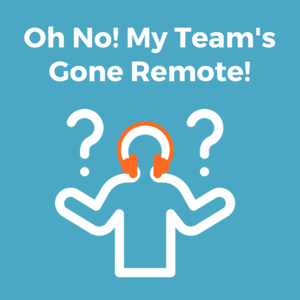WLP180 - Disability and Change at Work
Transitioning to an office-optional approach creates new opportunities for everyone to contribute – including the vast talent potential on offer from people with disabilities.
Don’t forget to tell us what you think, at https://www.virtualnotdistant.com/hello - not many people are talking about this important issue in the workplace, and we’d like to know what it means to you, or if it generates any new thoughts and ideas.
05:08 Work-life Interview: Jane Hatton, Evenbreak
Jane is the founder and director of Evenbreak, a job board founded in 2011 specialising in matching talented disabled candidates with inclusive employers. In 2018 it remains twice as hard for a disabled person to find a job, as a non-disabled person – so Evenbreak are working hard to narrow that gap.
Being a small social enterprise employing only disabled people themselves in a team distributed all over the UK, they work with many large UK employers - who are able to attract candidates they might not reach via any other means, but also position themselves effectively as inclusive hirers.
They also work hard at education on both sides, making sure disabled people know about the potential opportunities, but also that employers appreciate the wealth of skills and resourcefulness evident in the disabled community. Jane’s book A Dozen Brilliant Reasons to Employ Disabled People helps organisations start to fully appreciate everything disabled people have to offer.
Our interview also discusses changes in apps and assistive technology, such as voice recognition tools like Dragon, which are helping to level the playing field for colleagues with disabilities. And of course we look at the role of truly flexible working in helping everyone access the right professional role –whatever their needs and abilities.
Getting the culture right from the leadership level, is what is needed – to ensure motivated, productive wellbeing throughout an organisation.
Connect with Jane to find out more: Janeh@evenbreak.co.uk; Evenbreak.co.uk; +44 845 658 5717
33.57 Recommended Tool: Mindmeister
There are many mindmapping tools out there just now, and Maya has experimented with a lot of them – presently she is spending a lot of time in Mindmeister, a browser-based tool, that is good for collaboration.
It has simple intuitive controls – a mindmapping tool shouldn’t create any friction, just let you think out loud and get down thoughts as they flow, so it’s important that the tool itself doesn’t get in the way. You can get more fancy with adding links and notes, but for quick brainstorming it’s easy to get started. And there are nice mobile apps too – it’s great on the iPad.
It also integrates with Meistertask, if you want to use it to assign to-dos and get creatively beyond ‘the list’ to generate your ideas (this can be liberating for writing types especially!) Those integrations are paid options, but the free version lets you do quite a lot, and get a feel for whether it supports your own work.
38.06 Oh No, My Team’s Gone Remote! How are we going to cope with all this change?
Change is hard for human beings - in energy and time. And it affects different people in different ways, leading to a complex ‘emotional cocktail’.
Concentrating on all the new things to do, as we transition to an office-optional way of working, can mean we forget to consider: what do we want to keep? What is important to each of us about how we work and collaborate and relate to one another, that we want to ensure we don’t leave behind?
And what might we decide to STOP doing?
Being conscious about what we want, let’s us try out new things and create new rhythms for ourselves and our teams, instead of letting too much be emergent and unplanned.
Remember that fear of change, is often worse than the change itself.
We’ll see you again in two weeks, and meanwhile remember that we’d love to hear what you think of our content - please do complete our user survey here!
If you like the podcast, you'll love our newsletter:




